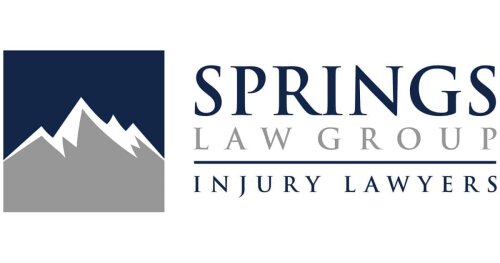
Best Insurance Fraud Lawyers in Colorado
Share your needs with us, get contacted by law firms.
Free. Takes 2 min.
Or refine your search by selecting a city:
List of the best lawyers in Colorado, United States

About Insurance Fraud Law in Colorado, United States
Insurance fraud in Colorado refers to any deliberate act committed to obtain an improper payment or benefit from an insurance process. This can include filing false claims, exaggerating losses or injuries, misrepresenting facts during the policy application process, or staging accidents. Both individuals and professionals can be accused of insurance fraud. In Colorado, insurance fraud is a serious criminal offense that can lead to heavy fines, repayment of benefits, and even jail time, depending on the severity of the case.
Why You May Need a Lawyer
You may need the assistance of a lawyer in a variety of insurance fraud scenarios. Common situations include being accused of submitting false claims, being investigated for fraud by your insurance company, or discovering that you are the victim of another party’s fraudulent claim. Lawyers are also needed if you are a business owner accused of defrauding workers' compensation insurance or if you have been approached by investigators and are unsure about your rights and responsibilities. Legal professionals can help protect your rights, guide you through investigations, represent you in court, and work with insurance companies to resolve disputes.
Local Laws Overview
Colorado law treats insurance fraud as a criminal offense under Colorado Revised Statutes, primarily Section 18-5-211. Under this section, it is illegal to knowingly submit false statements or documents to an insurance company with the intent to defraud. Insurance fraud in Colorado can be charged as a misdemeanor or a felony, depending on the value of the fraudulent claim or benefit. Penalties may include fines, restitution, probation, and imprisonment. Beyond criminal consequences, individuals may also face civil liability, policy cancellations, and complications with future insurance coverage. Colorado also requires insurance companies to report suspected fraud to the Colorado Division of Insurance, which conducts its own investigations in coordination with law enforcement.
Frequently Asked Questions
What is considered insurance fraud in Colorado?
Insurance fraud includes any intentional act designed to trick or mislead an insurance company to gain benefits or payments that would not otherwise be provided. This can involve exaggerating claims, staging accidents, or providing false information on applications.
What are the penalties for insurance fraud in Colorado?
Penalties vary based on the amount of money involved and the circumstances. They can include misdemeanor or felony charges, significant fines, restitution, probation, and jail or prison time.
Can someone go to jail for insurance fraud in Colorado?
Yes, depending on the severity and amount of money involved, insurance fraud can result in jail or prison sentences. Felony convictions for large sums can carry significant prison terms.
What should I do if I am accused of insurance fraud?
Do not talk to investigators or insurance representatives without first consulting a qualified lawyer. An attorney can help you understand your rights and options and how best to respond.
How do insurance companies detect fraud?
Insurance companies use advanced data analytics, fraud investigators, and cooperation with law enforcement to detect suspicious claims. They often review claims data, records, and conduct interviews.
Is making a mistake on a claim considered fraud?
Mistakes are not typically prosecuted as fraud. However, knowingly providing false information is considered fraud. It is important to correct errors immediately to avoid potential legal problems.
Are there defenses to insurance fraud charges?
Yes, defenses may include proving lack of intent, insufficient evidence, mistaken identity, or legitimate error. An attorney can help assess and develop an appropriate legal defense.
Can an insurance fraud conviction be expunged from my record?
In Colorado, some convictions may be eligible for sealing or expungement depending on the circumstances, but this is not guaranteed. Speak with a lawyer to determine your eligibility.
Who investigates insurance fraud in Colorado?
Insurance companies, the Colorado Division of Insurance, and local law enforcement agencies all play roles in investigating suspected insurance fraud.
What can I do if I suspect someone else of committing insurance fraud?
You can report suspected fraud to the Colorado Division of Insurance or contact the National Insurance Crime Bureau. Providing as much detail as possible will aid investigations.
Additional Resources
- Colorado Division of Insurance: Regulates insurance companies and investigates fraud in Colorado. - Colorado Attorney General’s Office: Provides information on consumer protection and insurance fraud. - National Insurance Crime Bureau: Offers resources to report insurance fraud and learn more about fraud prevention. - Local law enforcement agencies: Can assist with criminal aspects of fraud investigations. - Legal aid organizations: May provide free or low-cost advice for individuals facing fraud allegations or charges.
Next Steps
If you believe you need legal assistance regarding insurance fraud in Colorado, take these actions:
- Do not speak to investigators or make any statements without legal representation. - Collect all related documentation, such as insurance policies, claim records, correspondence, and any evidence supporting your case. - Seek out and consult with a lawyer experienced in Colorado insurance and criminal law. - If finances are a concern, contact legal aid groups or bar associations for referrals to reduced-fee or pro bono services. - Remain proactive and organized throughout the investigation and legal process, and always follow your attorney’s guidance closely.
Acting quickly and seeking reliable legal advice will help you protect your rights and work toward the best possible outcome in your insurance fraud matter.
Lawzana helps you find the best lawyers and law firms in Colorado through a curated and pre-screened list of qualified legal professionals. Our platform offers rankings and detailed profiles of attorneys and law firms, allowing you to compare based on practice areas, including Insurance Fraud, experience, and client feedback.
Each profile includes a description of the firm's areas of practice, client reviews, team members and partners, year of establishment, spoken languages, office locations, contact information, social media presence, and any published articles or resources. Most firms on our platform speak English and are experienced in both local and international legal matters.
Get a quote from top-rated law firms in Colorado, United States — quickly, securely, and without unnecessary hassle.
Disclaimer:
The information provided on this page is for general informational purposes only and does not constitute legal advice. While we strive to ensure the accuracy and relevance of the content, legal information may change over time, and interpretations of the law can vary. You should always consult with a qualified legal professional for advice specific to your situation.
We disclaim all liability for actions taken or not taken based on the content of this page. If you believe any information is incorrect or outdated, please contact us, and we will review and update it where appropriate.
Browse insurance fraud law firms by city in Colorado
Refine your search by selecting a city.








